Are we at a tipping point on guns?
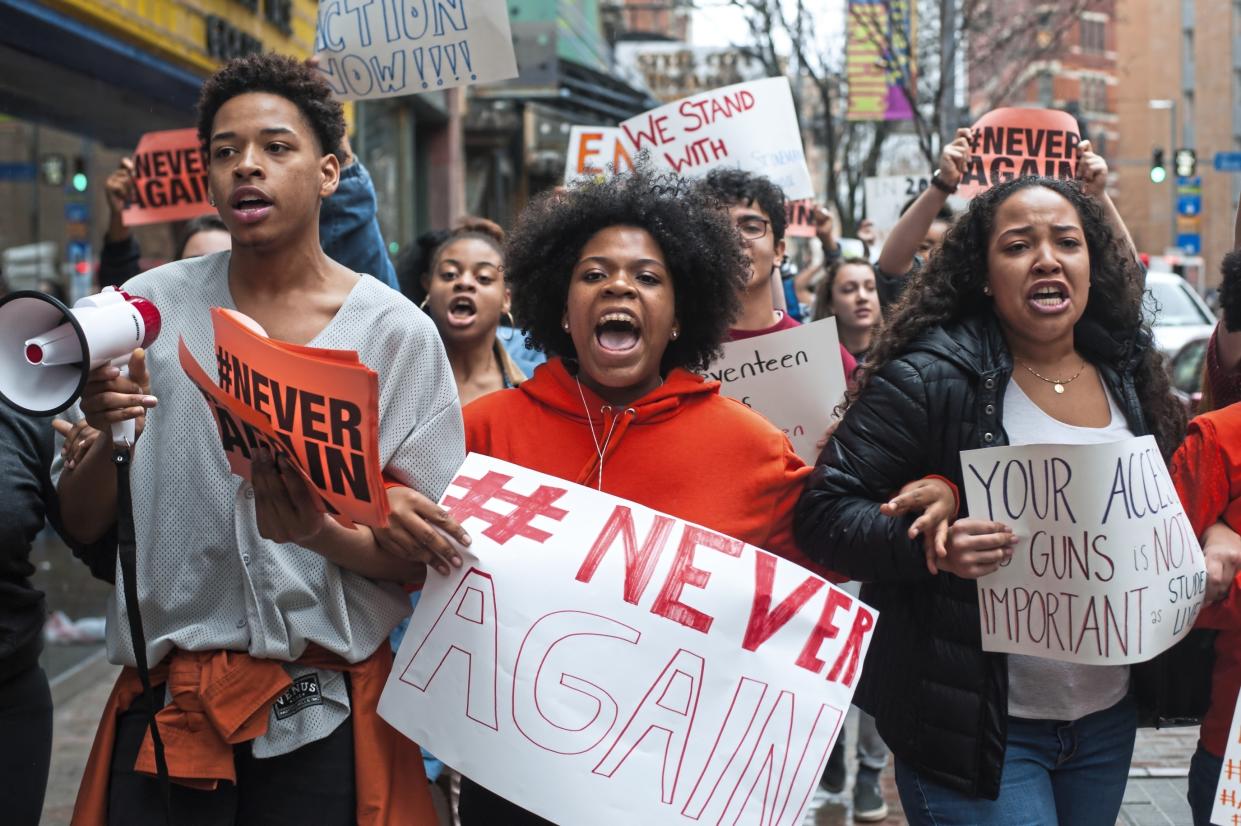
In the two weeks since the slaughter of 17 students and adults in Parkland, Fla., not much has changed in the way the country regulates guns. Anyone who could buy an assault rifle on Feb. 13 still can today. And yet, even with Republicans in control of Congress and the White House, the ground seems to be shifting in the direction of gun safety advocates who have been stymied for years. Whether this shift will last and what its long-term impact will be remain unknown. But the movement that began among the teenage survivors of the shooting at Marjory Stoneman Douglas High School, which hopes to bring as many as a half-million marchers to Washington next month, has become the latest in a long tradition of movements for social change that have transformed the politics of issues that were once seen as set in stone, from slavery to the casual acceptance of sexual harassment.
In the wake of the massacre at Douglas, the grassroots activists are giving a jolt of momentum to gun-safety advocates and putting the National Rifle Association on the defensive. Even if Congress punts on the gun control issue for the rest of the year, the speeches, marches and protests at state capitals in recent days are having an undeniable effect. Even states that have long opposed any gun control measures, such as Florida and Vermont, are actively considering new restrictions on firearms. Not since Bill Clinton’s first presidential term, when the Brady Bill restricting handgun sales and an assault weapons ban were enacted, have gun control advocates experienced a time so promising for legislative action.
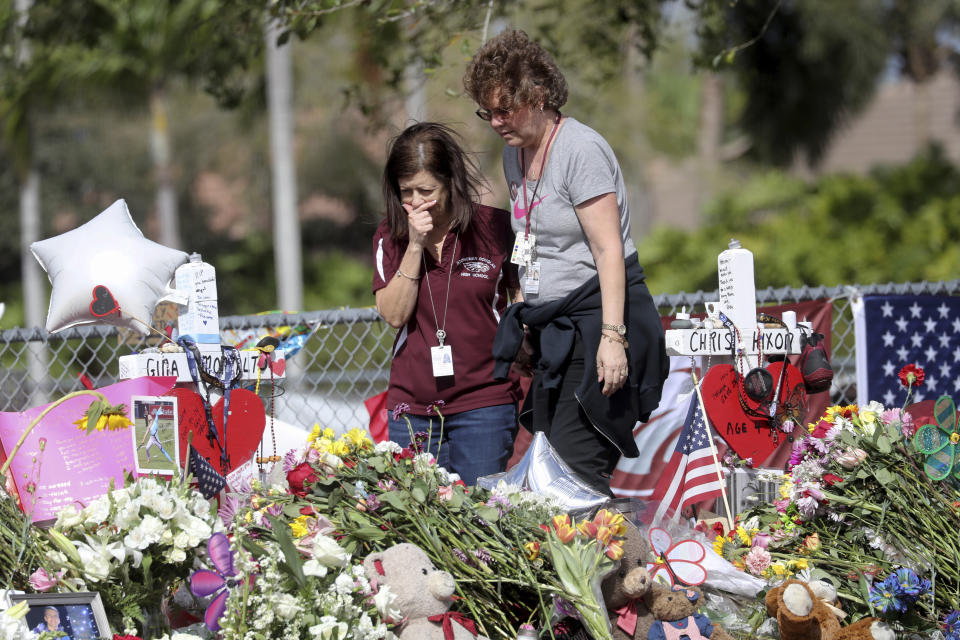
From Columbine, Colo., in 1999 to Newtown, Conn., in 2012 to Las Vegas last fall, mass shootings have done little to move the needle on gun control measures. Liberals proposed modest restrictions, and the NRA, with the backing of the Republican Party and some red-state Democrats, prevented them from being adopted. But this time seems different. The students are media-savvy, articulate and have effectively seized the moral high ground based on their first-hand experiences of the terror. They are highly sympathetic and dogged. They have joined the slipstream of activism that was touched off in Newtown, the culmination of anger built up over years of random massacres by assailants who had no business getting their hands on assault-style rifles. The latest young assailant had had numerous brushes with law enforcement and with mental health professionals, had raised alarms with neighbors and acquaintances specifically threatening to shoot up a school, and yet he slipped through the system and was able to buy a weapon designed to kill maximum numbers of people.
For these reasons, the growing pressure applied by student activists has appeared to pierce the NRA’s once-invincible political armor. Rep. Brian Mast, a Republican who represents the adjacent congressional district to the north, an Army bomb technician in Afghanistan who lost both legs in combat, endorsed a list of gun control measures including a ban on assault weapons, putting him at odds with the NRA. Florida’s Republican Gov. Rick Scott, who has an A+ rating from the NRA, has also broken with the organization, announcing his support for raising to 21 the minimum age to buy a rifle. Even President Trump has grudgingly committed to a ban on bump stocks (an accessory that turns semi-automatic rifles into machine guns) and floated the prospect that he might support some other modest gun control policies. In 2016, Trump had run for president as the NRA’s most vocal supporter and a loud defender of the Second Amendment.
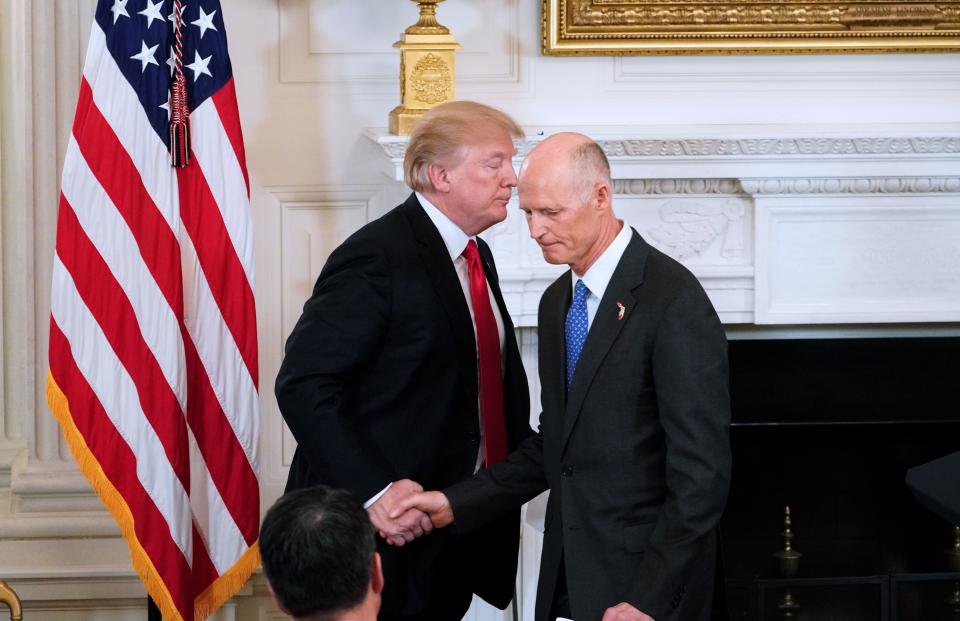
Republican Gov. Bill Haslam of Tennessee acknowledged the dilemma facing his fellow Republicans when he explained that in the aftermath of what happened in Florida, “people want to see action.” The GOP’s dominance of state and federal government includes 33 of 50 governor offices, 67 of 99 state legislative chambers and both chambers of Congress and the White House. Republican lawmakers have come under intense pressure to act, or at least to appear to act, on gun issues to keep their majorities in November’s midterm elections. Recent polls taken after the Douglas High School shooting reveal that public support for new gun safety laws is at its highest level since 1993. And even businesses are feeling pressure from consumers to end ties to the gun industry. Avis, Budget and Hertz rental car agencies; Delta and United Airlines; insurance giant Met Life, and the First National Bank of Omaha have all announced plans to end promotional programs in partnership with the NRA.
The student-led agitation in support of gun law reform is bringing about a nascent political shift on this once-intractable issue. Those in the vanguard of this social movement are drawing on a long tradition in which institutions and laws seemingly impervious to change were challenged, reconsidered and ultimately remade. The grassroots power of social activism has triggered shifts in public views on major issues and forced the parties to reckon with policies and politics in fundamentally fresh ways. Nineteenth-century abolitionism, for example, which historian Adam Rothman called “the primordial reform movement of American history,” involved African-American activists courageously protesting the evil of slavery while also developing an “effective politics.” Abolitionists, Rothman writes, “engaged in the streets, in the courts, and at the polls. Some dug in on the cultural front, preaching abolition in oratory, literature, and music.” And their political impact was notable: Some activists “sought to pry open Jacksonian America’s two-party political system by pressuring the Whigs and Democrats from within, or supporting third-party disruptions, beginning with the thoroughly abolitionist Liberty Party in 1840. These efforts finally paid off in the 1850s as the Whigs crumbled and a new antislavery party, the Republicans, arose in the North.”
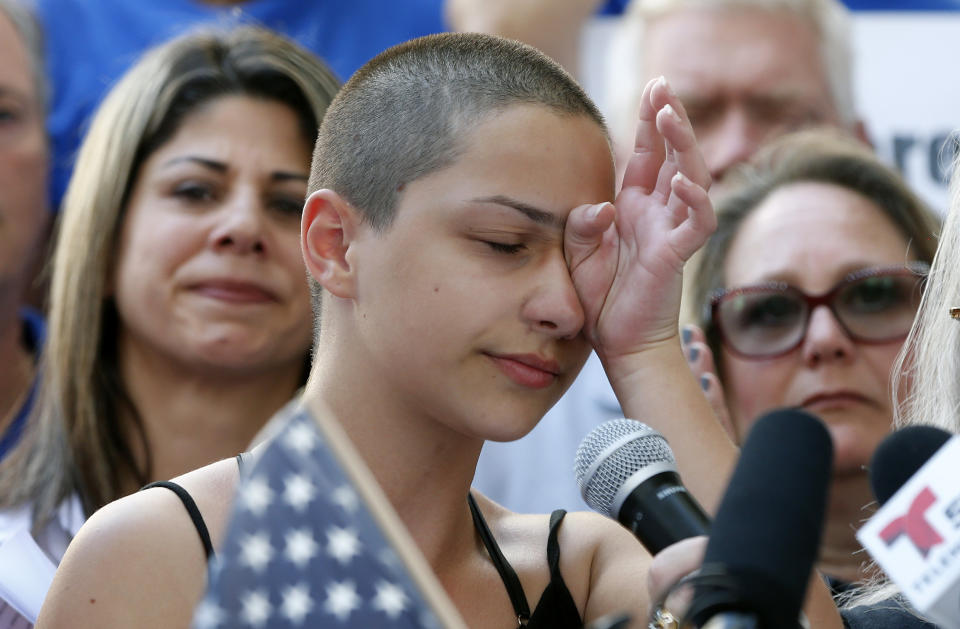
Tinkering with gun permit requirements hardly rises to the level of the struggle to abolish slavery. But like the abolitionists, today’s gun control activists are engaged in a form of moral agitation that is forcing political officials to acknowledge their arguments, grapple with their proposals and rethink some of their positions. Similarly, the post-World War II civil rights movement has echoes in the gun control movement of 2018. That earlier movement not only roused the nation’s conscience about racist laws and institutions but also pioneered a tactic, nonviolent direct action, to pressure local businesses and national elected officials. Perhaps no moment better encapsulated the movement’s political impact than Lyndon Johnson’s 1965 invocation, after the march on Selma, of the anthem “We Shall Overcome” in his congressional address on voting rights.
Just as a movement led by students organized business boycotts and captured national news attention for a cause; just as Dr. Martin Luther King Jr. and other protesters grounded their arguments in higher moral appeals and constitutional notions of freedom and equality, today’s gun control movement is being led by students, pressuring an older generation of mostly white lawmakers to acknowledge and respond to their claims and couching their appeals in notions of freedom and safety etched in the Declaration of Independence’s guarantee of “life, liberty, and the pursuit of happiness.” Teenagers and children, they are saying, have a right to go to school free from the terror of gun violence. Today’s activists are applying economic pressure to affect social change as well.
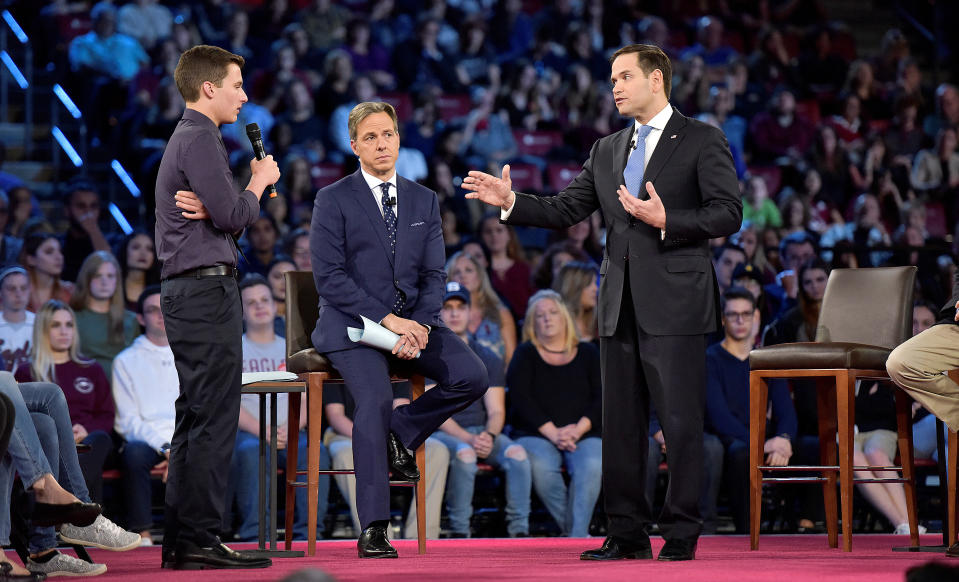
The social movement for women’s rights during the 1970s sought to raise public awareness about gender inequality, force politicians to grapple with these entrenched disparities, and to achieve legislative and legal remedies. Their moral agitation helped open the upper ranks of law, medicine and politics to women. That legacy is also fueling contemporary debates about women’s rights and gender equality, and informing the 2017 Women’s March, a surge of women political candidates and the #MeToo movement.
In the 1980s, social activism to increase research on AIDS showed how savvy social movements can thrust previously unacknowledged policy issues to the forefront of American life. In 1985, the gay and lesbian rights activist Cleve Jones asked marchers in San Francisco to write down the names of their friends who had died of AIDS. The project eventually evolved into a quilt that memorialized the thousands of lives lost to the disease, led to protests on the National Mall and at the National Institutes of Health and forced medical researchers and lawmakers to confront AIDS as a major public health problem for the first time.
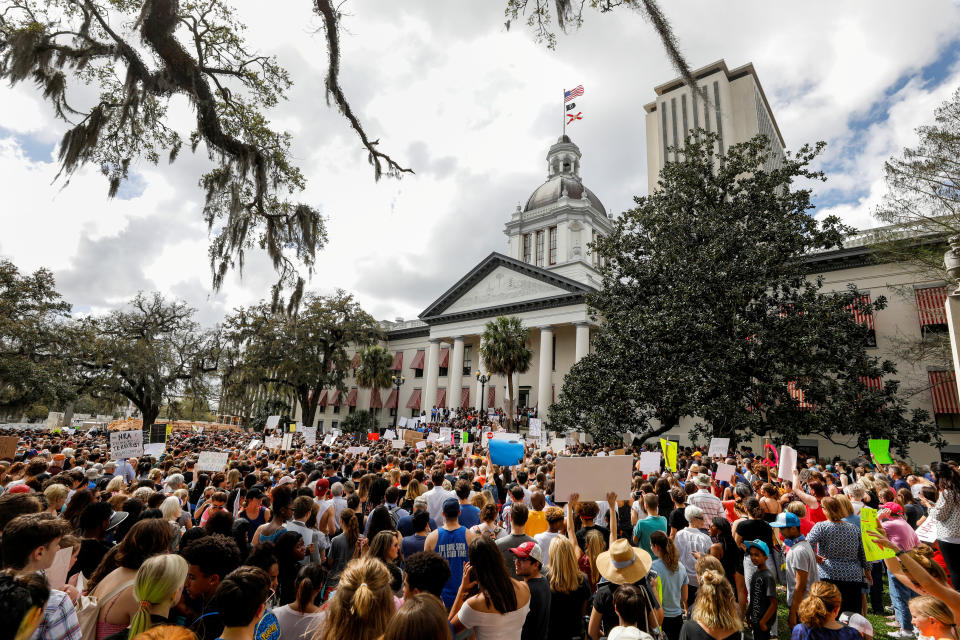
The fact of agitation around a particular cause doesn’t automatically yield legislative victories or shifts in the political climate, of course. Even victorious movements for social change have produced unfinished revolutions and mixed outcomes. The students, parents and teachers from Parkland are plugging into a well-established but not always effective nexus of gun control organizations, including the Brady Campaign to Prevent Gun Violence and the Giffords’ Courage to Fight Gun Violence group, both launched by public figures who were shot in assassination attempts. And despite the movement at the state level toward greater gun control policy, the most likely outcome in Congress is that it will do little to nothing to respond to the demands of the student activists in the near term. Yet, when the history of this moment is written, it may well be that the young agitators will be described as the ones who are pushing the once immovable boulder of gun control off its resting place and pointing it downhill, where it will gain momentum and leave the NRA-dominated gun politics behind in a cloud of dust.
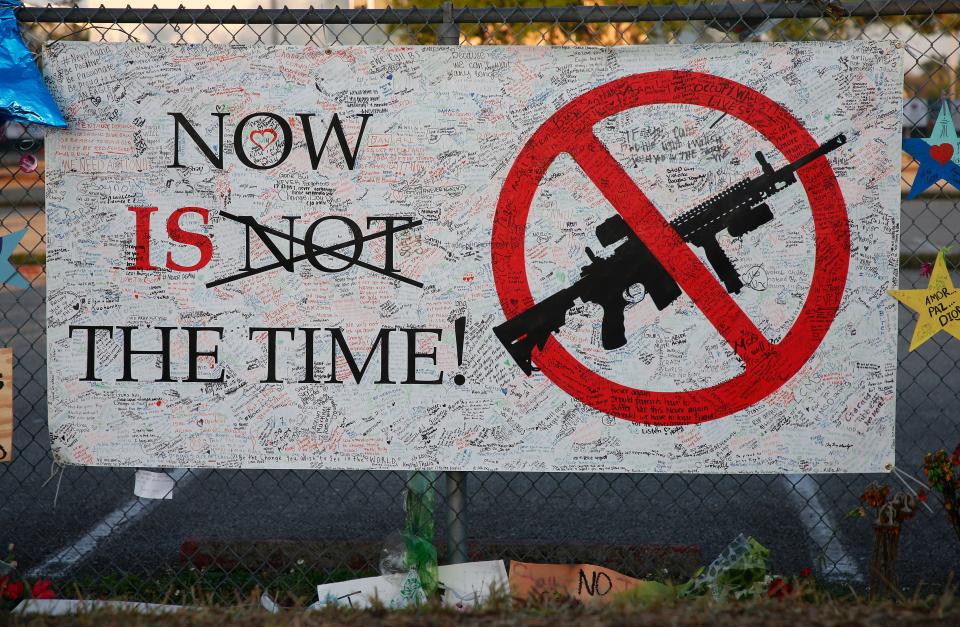
_____
Matthew Dallek, an associate professor at George Washington University’s Graduate School of Political Management, is author, most recently, of Defenseless Under the Night: The Roosevelt Years and the Origins of Homeland Security.
_____
Read more from Yahoo News:
House Democrats seek 20 to 30 more witnesses in Russia probe, but GOP resists
Jefferson’s ‘tree of liberty’ and the blood of schoolchildren
Author Eric Metaxas, evangelical intellectual, chose Trump, and he’s sticking with him
Meet the teen girl behind the National School Walkout movement
Photos: Chris Photos: Hondros’s life and pictures highlighted in documentary, ‘Hondros’

